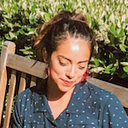How I Started Coding
Learning how to code has been a messy, consuming, non-linear learning experience but one I would choose over and over again. Coding brings me a lot of joy and is a skill that has helped me to build stronger connections to my professional goals and personal values (more on that in a later post!)
I hope this list is helpful to anyone thinking about starting to code or starting a new skill outside of school. Today I’ll be sharing about how I got oriented, joined community and started learning how to code.
Getting Oriented
- Talking with Latinx friends who were software engineers was my very first catalyst to learn how to code. Hearing my friends who were already professionals in the industry talk about their experiences made me curious and excited to learn more about tech. Their encouragement also made me feel confident to continue learning and exploring the field. I thought, ‘If they think I can do it, then maybe I really can do it!’
- Watching YouTube videos was also helpful with getting oriented early on. I didn’t have any data scientist friends at that time but I found channels and videos that helped me understand what data science was and gain an appreciation for just how expansive the field is. It took me a while to understand that data science is an amalgamation of advanced math, statistics and computing. DS is vast and 2 years into my journey, I am still coming across new applications in a range of industries all the time. Doubly exciting (and doubly disorienting)!
- Attending meetups was a great resource for making new friends with other students who were also learning how to code. I learned what types of questions other students were asking and sometimes, I got free meals at these events :D. I must’ve gone to over 20 different meetups in my first year!
Joining Community
- Subscribing to women in tech newsletters early on meant I started to get regular updates on opportunities for further learning, scholarships, and resources to continue learning how to code. Most of these resources were free and helped me feel really supported.
- Connecting on social media to tech-oriented Instagram pages and Slack communities like Techqueria facilitated connections with Latinxs in the tech industry. Techqueria also helped me to make some of my most wonderful friendships of 2019 and 2020 and even organize a meetup with other Latina women when I attended the 2019 Grace Hopper Conference in Florida.
- I created the public Instagram @followtechaccounts where you can click on the ‘following’ button for a quick reference to a list of tech-oriented accounts to follow. I recommend starting separate social media accounts that are designed to only follow your favorite tech accounts. That way, you won’t miss a thing, especially resources, tech inspo and announcements. Plus it helps to keep your social and tech life separate (This is still a boundary I’m working on!)
Online Practice
- Codeacademy is a free coding resource and was my very first introduction to learning how to code in the R programming language. It gave me the basic skills I needed to begin coding as part of analytical projects at work. While I don’t use it as much nowadays, learning R with Codeacademy was a critical turning point for me and introduced me to statistical libraries (code) that I could leverage on the job.
- Dataquest and Datacamp are the other online learning platforms I turned to when I first started to learn how to code in the Python programming language. I still turn to Datacamp sometimes when I need to learn new skills (currently enrolled in a short, SQLAlchemy module).
It took me about a year to find my way and to actually get consistent about accessing the resources above. In most of 2019, I struggled with learning how to be a student again, how to feel comfortable getting out of my comfort zone and mostly, struggled with getting out of my own way. In a next post, I’ll share about the data science bootcamp that really helped my data science learning take off and more about the challenges of staying focused as a newbie to the world of data science and programming.
If you would like to learn more about beginner resources, please reach out anytime!
